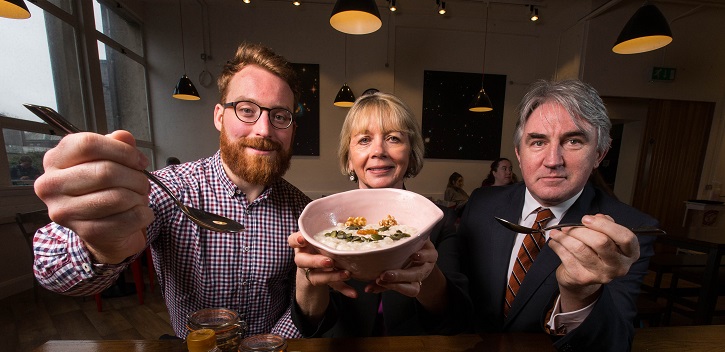Porridge is good for you...

A study from the APC Microbiome Institute at University College Cork has found that porridge has a positive effect on the gut, which, in turn, keeps the heart healthy.
Scientists at a Cork hub have been pioneering investigations into gut bacteria (microbiome) for years now, consistently discovering fresh links between what we have in our belly and our overall health.
The latest research from the APC Microbiome Institute shows that microbiome is related to heart health and it benefits from oat beta glucan, the fibre found in regular bowls of porridge.
Latest @pharmabiotic study finds porridge to be good for the heart and gut https://t.co/ajyJ6TRYxZ via @rte
— John F. Cryan (@jfcryan) March 13, 2017
The study, published this week in BioMed Central, found that consumption of oat beta glucan not only lowered blood cholesterol in mice, but it also helped to keep body weight down and benefited the microbes living in the intestines (gut microbiota).
“These results show we need to consider effects on the microbiome when treating cardiovascular disease through either food or medication” said Prof Catherine Stanton, leader of the research at the APC Microbiome Institute and Teagasc Food Research Centre.
The oat beta glucan actually altered both the composition and functionality of the gut microbiota (which can be bacteria or viruses), producing acid that protects against diet, while also acting as a prebiotic.
The study saw mice given oat beta glucan and plant sterol ester, the latter thought to help reduce levels of bad cholesterol. Other mice, treated with medication to help fight cholesterol, reduce body weight and the percentage of body fat, saw the same results.
“There is established epidemiological data supporting the role of specific food constituents, including oat beta glucan and plant sterols in cardiovascular health,” said Prof Noel Caplice, director of the Centre for Research in Vascular Biology at University College Cork (UCC).
Caplice claims that the study proves gut microbes can play a key role in cardiovascular health.
Eating porridge cuts risk of heart disease, study claims https://t.co/2I19EyQDFP via @IrishTimes
— SFI (@scienceirel) March 13, 2017
“Specifically, it shows that certain foods may facilitate weight loss as well as encouraging growth of beneficial microbes in our intestines,” he said.
“The message is to take porridge regularly to reduce your risk of cardiovascular disease whilst also protecting your gut microbiota,” added Stanton.
Did you have your porridge this morning? You should have, as it is good for your heart and your gut bacteria. https://t.co/m2q9sWCN5M
— Will Goodbody (@willgoodbody) March 13, 2017
Last summer, UCC (where the APC Microbiome Institute is located) was named a ‘Grand Challenges Explorations’ winner. Set up by the Bill and Melinda Gates Foundation, the Grand Challenges Explorations funding programme targets researchers that develop “a bold idea” in one of five critical global heath and development topic areas.
For Dr Jennifer Mahony and Prof Douwe Van Sinderen, that meant $100,000 in funding for an 18-month project to investigate the microbiota of infants in developing countries.
Prof Fergus Shanahan, director of the institute, was recently awarded a 2016 Royal Irish Academy Gold Medal in recognition of his career.
This article was published in the SiliconRepublic March 13, 2017
For more on this story contact:
Dr Catherine Buckley, APC Microbiome Institute, UCC Mob 086-8554744 More http://apc.ucc.ie/
